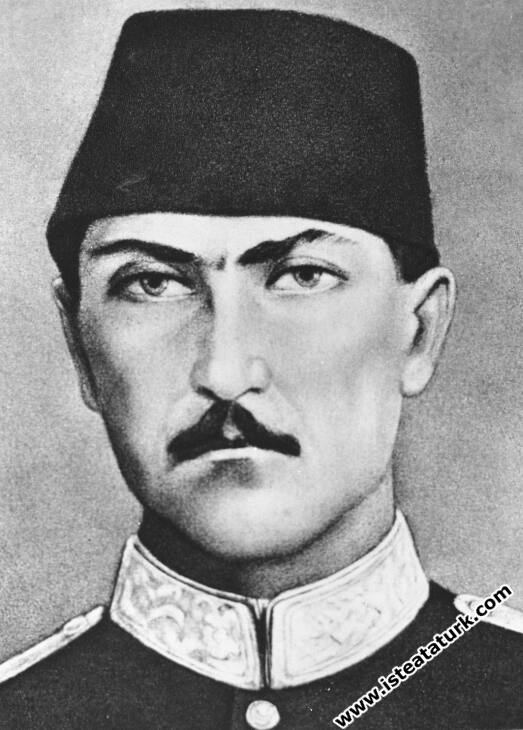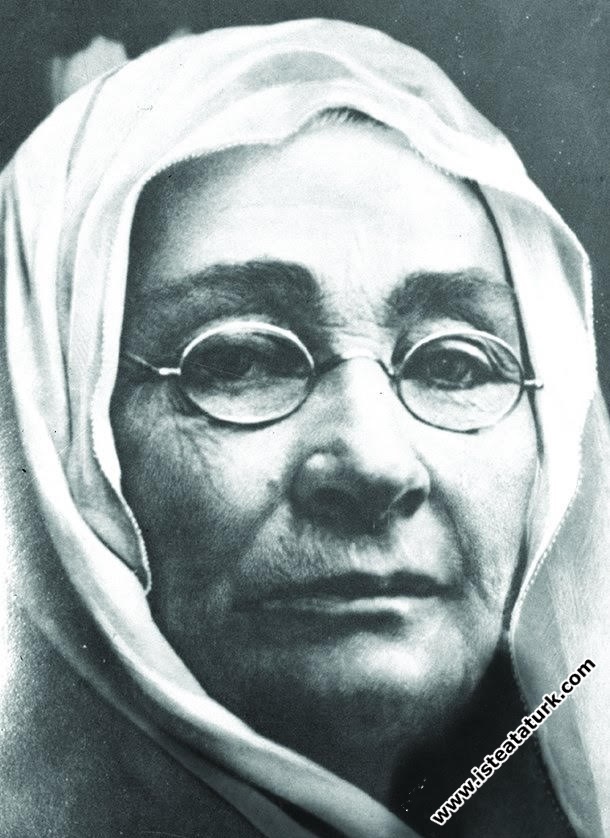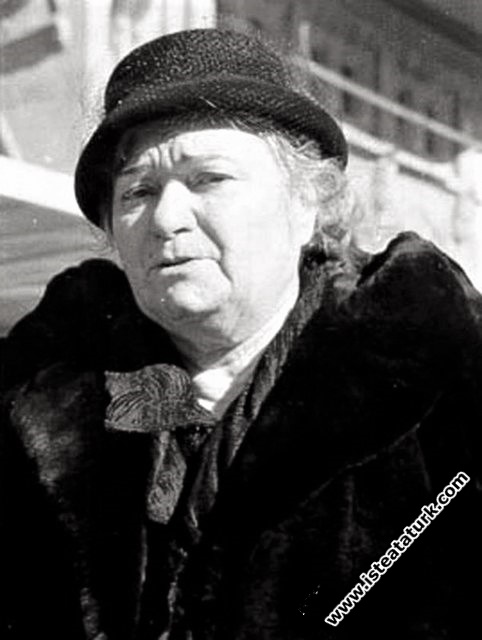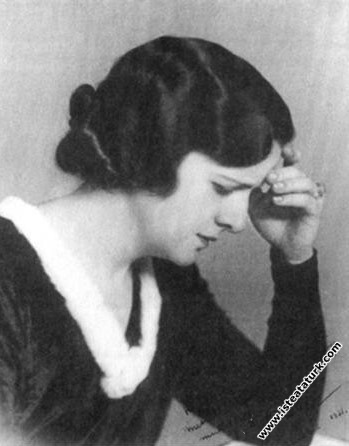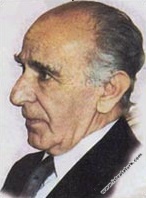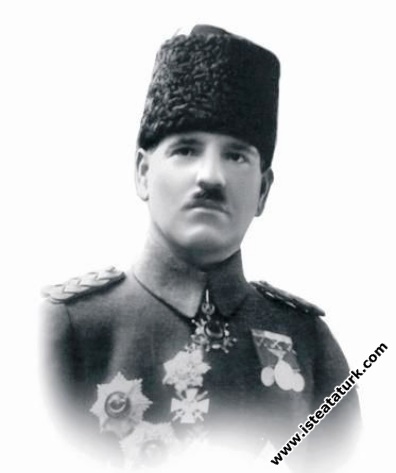
Ali Fuat Cebesoy
Character Size
Life of Ali Fuat Cebesoy
ALİ FUAT CEBESOY
Lieutenant General Ali Fuat Cebesoy** was one of Atatürk's close friends. While Atatürk was the Commander of the 7th Army in the First World War, Ali Fuat Pasha was the commander of the 20th Army Corps at the establishment of this army.
Ali Fuat was Atatürk's support in the West in the first years of the War of Independence. He remained loyal to Mustafa Kemal Pasha, who did not give in to the pressures of the Sultan and the Istanbul Government, who did not take into account the conditions of the country, and left his military service, and he made an effort to fulfill his wishes with all his might by counting them as orders. Although they could not agree on some issues later on, his love and respect for Atatürk never diminished.
During the peace period, Atatürk was very upset by his indecisive stance between the military and the politicians, especially the fact that he could not prevent the reactionaries from nesting in this party despite being the General Secretary of the “Progressive Republican Party”. The involvement of his name in the assassination event against Atatürk also caused this sadness to increase.
Upon the acquittal of Ali Fuat Pasha and his other close friends, their old affinity with Atatürk re-established in time; He had the opportunity to serve as a Member of Parliament, Minister and Speaker of the Assembly.
A. ALİ FUAT CEBESOY'S LIFE 1. Birth and Secondary Education:
Ali Fuat Cebesoy was born in September 1882 (1298) in Istanbul. He is the son of E. Lieutenant General İsmail Fazıl Cebesoy, the first Minister of Public Works of the Republic of Turkey. He is not married. He completed his primary education in Erzincan and his secondary education at Saint Joseph High School in Istanbul.
2. Ali Fuat Cebesoy's military life:
In 1899 (1315), he entered the Military Academy with an examination, finished the school on January 9, 1901, continued his education at the Military Academy and became a Staff Captain on January 11, 1905 and was appointed to the 5th Army. He worked in this army headquarters for a while, after doing his internship in the 3rd Gunner Battalion in Beirut, the 28th Cavalry and 15th Artillery Regiments in Thessaloniki, he became Kolağası in 1906, and served as the 3rd Army Inspectorate Headquarters in Thessaloniki until 1908. He worked in.
Between March 13, 1908, and January 9, 1909, he served as the Chief of Staff of the 3rd Cavalry Division and the Command of the Karaferya Region, and was awarded the Order of Mecidi from the fourth rank for his success in following the bandits.
He was appointed to the Roman Military Attaché at the beginning of 1909, remained there until 1 October 1911, and became a Major in 1911. During the Tripoli War, he took additional duties in Europe to send weapons and ammunition to the forces gathered on the Adriatic coast.
Ali Fuat Bey was in the Army in Manastır and the 3rd Corps Headquarters in Skopje. Meanwhile, he participated in the Albanian uprising as the Brigade Commander, and was rewarded with the Order of Osmani from the fourth rank and Majidi from the third rank due to his achievements, and his rank was promoted to Major.
He was appointed to the 1st Branch Manager of the Western Army on 1 October 1911, to the 1st Corps Chief of Staff on 20 February 1912, and then to the 7th Corps Chief of Staff. He was the commander of the detachment formed by the 7th Corps for the liberation of İpek and Yakova from the rebels, and participated in the defense of Ioannina as the Deputy Commander of the 23rd Division between November 10, 1912 - March 1913. Major Ali Fuat Bey, who was wounded in three places in this operation, was promoted to Lieutenant Colonel.
Despite the fall of the Ioannina Castle, the Pizani heroes under the command of Ali Fuat Bey defended their positions until the end, but withdrew by the order of the Commander-in-Chief.
Lieutenant Colonel Ali Fuat Bey, who was the Chief of Staff of the 8th Corps in Damascus between January 15 and September 19, 1914, was appointed to the Command of the 25th Division in Damascus on September 19, 1914, upon the start of the First World War, and with his division on the First Channel. He participated in the operation. Due to his achievements here, he became a Colonel in 1915, was awarded the War and Combat Silver Merit Medals, and the German State awarded the Second Iron Salip Order.
Colonel Fuat Bey, who moved to the Çanakkale region with his division, participated in the last phase of the Battle of Seddülbahir and was awarded the Battle Silver Privilege Medal.
Colonel Ali Fuat Bey, who participated in the battles in the Caucasus Front as the 14th Division Commander between January 20 and September 30, 1916, was awarded the Golden Merit Medal for his success in the Battles of Çapakçur.
He was appointed to the 5th Division Command on 30 September 1916 and to the 20th Corps Command after the Second Battle of Gaza. He was awarded the Order of Military Merit with Sword from the second rank by the German State.
Between January 12 - April 1917, the 2nd Army Chief of Staff, between April -30 June 1917, Deputy Front Commander in the Third Battle of Gaza and Palestine, and defense of Jerusalem, was awarded the Combat Gold Medal of Concession. He became Mirliva (Major General) in 1917, and the German State awarded the First Iron Salip Order.
Ali Fuat Pasha, who was again the 20th Corps Commander between 30 June 1917 and 9 September 1919, also acted as the 7th Army Command for a while.
Due to his success in the First and Second Salt Wars, he was rewarded with the Order of the Second Mecidi with Sword and the Second Osmani with Sword in 1918, the German State awarded the Red Eagle, and the Austro-Hungarian Empire the Order of the Iron Crown.
In September 1919 - June 1920, he served as the Commander of the Western Anatolian General Kuva-yı Milliye, without prejudice to his duty as the Commander of the 20th Corps; On 26 June - 10 November 1920, he continued his duty under the name of the Commander of the Western Front, and at the same time became a member of the Turkish Grand National Assembly (MP). He was awarded the Red Green Striped Medal of Independence for his services here.
On 20 November 1920 - April 1922, he served as the Moscow Ambassador of the GNAT Government, and on his return served as the Deputy Speaker of the Grand National Assembly of Turkey until 21 October 1923. After the proclamation of the Republic, his rank was promoted to Lieutenant General and appointed to the 2nd Army Inspectorate. (He has been taken on indefinite leave by the decision of the parliament, without prejudice to his duties here.)
He resigned from the Army Inspectorate on 31 October 1924 and returned to the Parliament as Ankara Deputy.
On October 1, 1927, when his legislative term expired, he was put on military shortfall and retired from the military on December 5, 1927.
Duties in Civil Life:
IV, VIII of the Grand National Assembly. During the period of Konya Deputy, IX. Term Eskişehir Independent Deputy, X. and XI. He became an Independent Istanbul Deputy from the same period, the Minister of Public Works on April 3, 1939 - March 9, 1943, the Minister of Transport on March 9, 1943 - August 5, 1946, and the Speaker of the Turkish Grand National Assembly on January 20, 1948 - November 1, 1948. He died on January 10, 1968 in Istanbul. Geyve lies in the courtyard of Ali Fuat Pasha Mosque.
He spoke French and German.
Works of Ali Fuat Pasha: Memories of the National Struggle, Memories of Moscow, Birussebi - Gaza Pitched Battle and 20th Corps, Classmate ATATÜRK, Political Memories, Mustafa Kemal National Leader.
B. ALI FUAT CEBESOY'S STAFF AND COMMAND CHARACTERISTICS:
1. Staff Qualifications:
Ali Fuat Bey is a staff officer who is serious, hardworking, honest, knowledgeable, brave, bilingual and producing.
He was successful in his staff duties in various headquarters, made him count among his subordinates and endeared him to his superiors.
2. Command Attributes:
As the division and corps commander, he brought his unit to safety under heavy combat conditions. He was an experienced commander who participated in almost all of the wars and battles that took place during his lifetime.
He was successful as the General Commander of the National Forces at the beginning of the War of Independence, but when he was the Commander of the Western Front, despite the opposition of the Chief of General Staff, he lost the trust of his subordinates and was dismissed from the Front Command due to the Gediz attack and the withdrawal of his unit after being defeated. When he returned from the Moscow Embassy, he did not accept the 1st Army Command and later said that he did not like the politics and asked for the 2nd Army Command, and after a year he said that he would return to his duty in the Parliament and resigned from the army command, losing the trust of his old and close friend Mustafa Kemal Pasha.
(We will see the disagreements that arose between him and Mustafa Kemal Atatürk during the War of Independence and in the post-war period in the relevant section)2
C. ALI FUAT CEBESOY'S WAR AND BATTLES: Ali Fuat Cebesoy in the 1st Ottoman - Italian War
During the Battle of Tripoli in 1911, he was stationed at the Army Headquarters in Manastır, where the forces gathered on the Adriatic coast were attached, and the 3rd Corps Headquarters in Skopje, then sent to Europe to supply Tripoli with weapons and ammunition.
While in Skopje, he commanded a brigade of various units and played a role in suppressing the first phase of the Albanian rebellion.
Ali Fuat Cebesoy in the 2nd Balkan War
Exchange rate. Maj. Ali Fuat Bey was appointed to the Operations Branch Directorate of the Western (Western) Army on October 1, 1911. He left this position on February 20, 1912 and served in various staff positions. On September 29 - November 10, 1912, he served as the Chief of Staff of the Ioannina Corps in Shkodër in the establishment of the Western Army, and as the Deputy Commander of the 23rd Division in the establishment of the Ioannina Corps on November 10, 1912 - March 1913. (The Ioannina Corps is one of the units on the Greek Front.) Since the Western Army took action on October 16, 1912, Kur. Maj. Ali Fuat Bey is considered to have commanded the 23rd Division during the Balkan War. As a staff officer who served at almost every level of this organization, he dominated his unit and operational plans.
The Balkan War began on October 16, 1912, when the Eastern and Western Armies took action after the Serbian and Bulgarians gave a note on 14 October 1912 and their troops invaded our borders.
In the face of this unexpected attack of the Turkish army, the Serbs managed their movements not according to the plan, but according to the effect of the Turkish attack.
The target of the Greeks was Thessaloniki. After this city was taken, they would fall behind the Vardar Army against the Serbs.
The target of the Montenegrins was Shkodra. Then they would occupy the western region of Shardagi.
The realization of the Bulgarian plan was facilitated by the fact that the Turks moved forward and attacked ahead of time.
The Turkish Eastern Army had to withdraw to the Pınarhisar - Lüleburgaz general line in the battles with the Bulgarian forces on the Edirne - Kırklareli general line and to the north of this line, without making the necessary preparations in terms of domestic and foreign policy and without even being able to gather half of its forces.
The Western Army had also lost the battle at Komonova and withdrew to the Monastery. Turkish troops in Edirne Fortified Area, Ioannina and Shkodra continued their defense. The achievements of the 23rd Division in “Pista” and “Pizani” are commendable.
Major Ali Fuat Bey was wounded in three places in this battle and was promoted to Lieutenant Colonel due to his successes. Despite the fall of the Ioannina Fortress, the Pizani heroes resisted, but ended the fighting on the orders of the Commander-in-Chief.
The Eastern Army, which retreated behind the Çatalca position with the orders of the Commander-in-Chief, broke the Bulgarian attacks by making this position an impassable fortified position, and this success was very beneficial politically and militarily.
The armistice negotiations, which started on 26 November 1912, were signed by the parties (excluding Greece) on 3 December 1912. Following the London Treaty, the Second Balkan War started on 3 June 1913 between the Balkan allies and the Balkan War ended with the Istanbul Treaty on 29 September 1913. Ali Fuat Bey was appointed as the Chief of Staff of the 8th Corps in Damascus.
3. Ali Fuat Cebesoy in the First World War
Due to successive wars in recent years, stocks were depleted and resources dried up.
The political situation was very critical because of the groupings of the European great powers and their ambitions on the Ottoman state. Neither side was willing to come to an agreement with the Ottoman state in order to satisfy their ambitions.
In this atmosphere, the First World War started after Archduke Ferdinant of Austria-Hungary and his wife were killed by a Serbian student in Sarajevo. After a while, Germany also started a war with Russia. Thereupon, Germany approached to sign a secret agreement with the Ottoman government on 2 August 1914.
The First World War had engulfed all of Europe as of 3 August. When the German offensives stalled on the Western Front, they demanded the implementation of the 2 August agreement. Things got mixed up and we finally entered the war with the tragic game that went down in history as the Black Sea Incident. First, the Russians attacked our Caucasian borders. Immediately afterwards, the British navy opened fire on targets in the Gulf of Izmir and the Dardanelles. On November 3, 1914, the Ottoman Empire entered the war with all the Tripartite Agreement States.
Exchange rate. Yb. Ali Fuat Bey was appointed to the 25th Division Command in Damascus upon the start of the First World War. He participated in the I. Channel Operation with this division and was promoted to the rank of Colonel due to his success in this battle. He came to the Çanakkale Front with his division in 1915 and participated in the last phase of the Battle of Seddülbahir.
After the victory of Çanakkale, Kur. alb. Ali Fuat Bey was appointed to the 14th Division Command and moved to the Caucasus Front with his division. The 14th Division was useful in the Battles of Çapakçur, and the Division Commander, who led and managed his unit with merit, was awarded the Gold Merit Medal. Ali Fuat Bey, who was appointed to the 5th Division Command from here, was appointed to the 20th Corps Command after the Second Gaza War, and served as the Front Commander in the Third Gaza and Palestine Battles, which ended with the defense of Jerusalem, and defended Jerusalem. He was promoted to the rank of General due to his outstanding achievements in these battles.
Ali Fuat Pasha remained in the 20th Army Corps Command until the Armistice of Mudros, and in the meantime, he saved the Palestine Front from disaster by preventing the British splitting movement along the Sharia river valley twice.
In this operation, which is known as the First and Second Salt Battles in the history of the war, many weapons, ammunition, materials, equipment and animals were captured and many prisoners were taken. Their success in these battles was congratulated and appreciated by the 7th Army Command.
Before the armistice, while all the troops on the Palestine Front were in danger of annihilation in the great attacks of the British, the 20th Corps saved most of the tough rearguard battles and reorganized in Aleppo and completely destroyed the two cavalry brigades of the British reinforced with armored forces. Thus, he prevented the Taurus Mountains from falling into the hands of the enemy.
Ali Fuat Pasha, who was also deputizing for the 7th Army Command since Mustafa Kemal Pasha was appointed to the Command of the Yıldırım Armies Group at that time, sincerely participated in his commander's visions of national liberation and wanted to prevent anarchic movements in Western Anatolia and to replace them. He met with Mustafa Kemal Pasha and other relevant people in Istanbul in order to prepare the organization that would be the basis of national liberation, and by returning to the head of his unit, he transferred his corps first to Konya Ereğlisi and then to Ankara.
4. In the War of Independence:
Ali Fuat Pasha, who came to Amasya with Rauf Bey upon the call of Mustafa Kemal Pasha, signed the invitation to the congress (Amasya Circular) prepared on the night of 21/22 June 1919, without the slightest hesitation, in the face of the indecisive attitudes of Rauf and Rafet Bey. After Mustafa Kemal Pasha said that it was a historical document, Rauf Bey also signed it, Colonel. Refet Bey also made a vague sign.3 In the face of attempts to undermine the Sivas Congress, Ali Fuat Pasha, with the confidence and approval of the congress, made harsh warnings to the governors who acted timidly (especially to the Ankara and Konya Governors), and sent national commanders from high-ranking officers to the regions.4
Ali Fuat Pasha became the Commander of the Western Anatolian General Kuva-yı Milliye in September 1919. Pasha accepted Eskişehir and its surroundings as a national region and appointed Cavalry Lieutenant Colonel Atıf Bey as the Commander, and the 23rd Division Commander Ömer Lütfü Bey, accepting Afyonkarahisar and its surroundings as a national region.
At that time, there were British troops in Eskişehir. These are Yb. They arrested Atıf Bey and sent him to Istanbul. Fuat Pasha personally went to Çemşit close to Eskişehir with the national forces he could gather and besieged Eskişehir from afar, while a memorandum was given to his representatives in Istanbul. Finally, the British promised that they would never interfere in our National Struggle and withdrew their forces in Merzifon, Yb. Atıf Bey also returned to his duty.5
Ali Fuat Pasha's signature on the decision about the place where the Assembly of Deputies will convene, the form and working method of the Representative Committee and the national organization, and the way to be followed in case the Paris Peace Conference takes a positive or negative decision for us. had.6
Upon the Minister of Interior's sending some advisory delegations to Anatolia, it was deemed appropriate that Ali Fuat Pasha be at the head of his corps in Ankara, and Colonel of the Salihli and Aydın Fronts Command. Refet Bey was sent.7
Ali Fuat Pasha was dismissed during the reign of Damat Ferit Pasha. The 24th Division Commander in Ankara, Yb. Mahmut Bey was deputizing. Ali Fuat Pasha was both the General Commander of the National Forces and took care of the Army Corps. Therefore, he dominated his Corps.8
He was appointed to the Command of the Western Front on 18 June 1920. He started his duty on 20 June.9
(The Gediz Offensive on 24 October 1920, the Greeks counterattacked on 25 October and took Yenişehir and İnegöl, the Force-i Seyyare and the army's accusations of each other, Ali Fuat Pasha's sending to the Moscow Embassy, and subsequent developments will be discussed in the "D" section. .)
D. DISPUTES BETWEEN ATATÜRK AND ALI FUAT PASHA:
Ali Fuat Pasha, the 20th Corps Commander, was Atatürk's school and youth friend and his western support at the beginning of the war. Disputes between them during Ali Fuat Pasha's Western Anatolian General Forces Command, Gnkur. Although the Presidency insisted that the Gediz attack should not be carried out, it started with this attack and when it was defeated and lost the trust of its subordinates. But Atatürk showed his greatness in this event as well. Taking into account his former services, he sent him to the Moscow Embassy. Although he did not accept the 1st Army Command on his return, he ensured that Ali Fuat Pasha was promoted to Lieutenant General and appointed to the 2nd Army Command after a while after the commanders who took part in the great victory were promoted.
We can explain these events as follows:
1. Ali Fuat Pasha was also Colonel. He was among those who opposed İsmet Bey's Chief of Staff. alb. They said that they went to Anatolia together with Refet Bey at the same time as Mustafa Kemal Pasha before. Pasha calmed them by saying that he had to return to Istanbul, etc., upon the call of Marshal Çakmakl.
2. The defeat of Gediz and the removal of Ali Fuat Pasha from the Western Front Command:
The internal revolts that started against the national initiatives spread rapidly all over the country. The forces sent against these rebellions, Çerkez Ethem, Major. Nazım Bey, Yb. Arif Bey and Major. It consisted of four groups, including the (Çolak) İbrahim Bey detachments.
Ali Fuat Pasha, for the section stretching from the Geyve Strait to Adapazan, Alb. Refet Bey was in command of the section stretching from Ankara to Bolu via Beypazarı.
On 28 June 1920, Ali Fuat Pasha became the Commander of the Western Front. 11th
On 24 October 1920, despite the opposition of the Chief of the General Staff, n attacked the enemy in Gediz with the 61st Division and the Force-i Seyyare. We were defeated in Gediz after some fluctuating, undisciplined, and uncommanded movements; On October 25, 1920, the Greeks counterattacked and occupied Yenişehir and İnegöl, and our troops retreated to the Dumlupınar ridge.
Circassian Ethem and his brothers put the blame on the Front Commander and the regular army divisions, making propaganda that they were put in a difficult position. The army also said that Kuvve-i Seyyare could not do any work.12
Believing that Ali Fuat Pasha could no longer command the Western Front, Mustafa Kemal Pasha sent him to the Moscow Embassy.
This front command, which expects a very serious and careful study, is the Chief of General Staff, who is already carrying out the general military operation. It was given to İsmet Bey as an additional task. (North Section)
A strong cavalry organization was needed. Just in order to establish this organization, Minister of Interior Rafet Bey was sent to Konya and its surroundings with an additional mission. (Commander of the Southern Section of the Western Front) would act as the Chief of General Staff, the Minister of National Defense, Fevzi Pasha.13
3. Ali Fuat Pasha says he doesn't like politics. But he resigns from the 2nd Army Command in order to return to the Parliament:
Ali Fuat Pasha did not accept the 1st Army Command (because he had previously commanded the front) on his return from the Moscow Embassy. Refet Pasha also did not agree to this task.14
After the victory, the ranks of the commanders who participated in the War of Independence were promoted. The Deputy Speaker of the Assembly, Ali Fuat Pasha, asked the Commander-in-Chief to be appointed as the 2nd Army Commander through Rauf Bey and stated that he did not like the policy. However, in the army he wanted to be appointed, there were corps commanders of higher rank than him. It was also requested that a suitable task be given to Refet Pasha and the promotion of both pashas due to the victory. Although the Commander-in-Chief said before that these pashas who avoided participating in the military operation could not be equated with those who participated, he could not offend his close friends and ensured that Ali Fuat Pasha was promoted to lieutenant general and appointed to the 2nd Army Inspectorate, taking into account his past services.15
Refet Pasha was also sent to Istanbul as the Extraordinary Representative of Istanbul and Thrace.16
Ali Fuat Pasha, who said that he did not like politics, came to Ankara on October 30, 1924 and asked the 2nd Army Inspectorate for his horse since he was going to start his duty as a Member of Parliament.17
Kazım Karabekir Pasha also announced that he resigned from the 1st Army Inspectorate on October 26, 1924. Both Pashas were sent to the head of their armies by the General Staff to hand over their duties to the new commanders, and they were not accepted into the Assembly. Atatürk talks about the failure of a great conspiracy in which Rauf Bey was involved in his Nutuk.
4. Ali Fuat Pasha is appointed as the General Secretary of the “Progressive Republican Party”:
Kazım Karabekir Pasha was appointed as the Chairman of the “Progressive Republican Party” formed by the opposition, and Ali Fuat Pasha was appointed as the General Secretary and religious thoughts and beliefs were used as a flag.18 Independence Courts were established and this party was closed.19
5. The names of Ali Fuat Pasha and some of his close friends are also confused in the assassination against Atatürk, but they are acquitted:
Unfortunately, these pashas were also involved in the assassination event against Atatürk and they were tried in the İzmir Independence Court under the presidency of Afyon Deputy Ali Çetinkaya. Ali Fuat Pasha, Kazım Karabekir Pasha and Refet Pasha were among those who were acquitted.
After a while, Atatürk made peace with these three pashas, and even in 1933, Ali Fuat Pasha was re-elected as Konya Independent Deputy upon Atatürk's invitation.
For this reason, a declaration was published by the Deputy Chairman of the Party, İsmet Pasha, and the Secretary General of the Party, Recep Bey, sent a circular to the Konya Party Organization.
As explained in his life section, Ali Fuat Pasha, who was elected as an Independent Deputy of Konya, later also served as an Independent Member of Parliament for Eskişehir and Istanbul.
6. During the Presidency of İsmet İnönü:
Between April 3, 1939 and March 9, 1943, the Ministry of Public Works in the Cabinet of Refik Saydam,
Between March 9, 1943 and August 5, 1946, the Ministry of Transport in the Cabinet of Şükrü Saraçoğlu,
He served as the President of the Turkish Grand National Assembly between January 20, 1948 and November 1, 1948.
We saw the disagreements between Atatürk and Ali Fuat Cebesoy. In conclusion, we can say the following:
With the Armistice of Mudros, the most beautiful regions of the country were occupied. In order to clear these places from the enemy and to gain independence for the nation, Atatürk requested the 20th Corps to be transferred to the Ankara region quickly during his last meetings in Istanbul with his schoolmate and one of the army's corps commanders, Ali Fuat Pasha, and Pasha fulfilled this request. These patriotic pashas and their close friends worked hard for four years. Naturally, there were differences of opinion and thought in the military, administrative and political fields during this period. But when the victory was finally won and the period of peace began, the seemingly simple differences of opinion began to surface. In the first years of the Republic, Ali Fuat Pasha was withdrawn from military service by his friends in the opposition and was appointed as the general secretary of the "Progressive Republican Party" headed by Kazım Karabekir Pasha. This party was invaded by the reactionaries over time, and religious bigotry was heightened by exploiting the beliefs of the party leaders. As a result, the pashas were tried in the Independence Court, on the same side as those who had assassinated their close friends, Atatürk, whom they greatly admired, but were acquitted, as it turned out that they did not engage in such criminal activities and were completely innocent. Over time, his old relations with Atatürk formed, and in 1933, upon the invitation of Atatürk and the support of İsmet Pasha, Ali Fuat Pasha became an Independent Konya Deputy. This party was invaded by the reactionaries over time, and religious bigotry was heightened by exploiting the beliefs of the party leaders. As a result, the pashas were tried in the Independence Court, on the same side as those who had assassinated their close friends, Atatürk, whom they greatly admired, but were acquitted, as it turned out that they did not engage in such criminal activities and were completely innocent. Over time, his old relations with Atatürk formed, and in 1933, upon the invitation of Atatürk and the support of İsmet Pasha, Ali Fuat Pasha became an Independent Konya Deputy. This party was invaded by the reactionaries over time, and religious bigotry was heightened by exploiting the beliefs of the party leaders. As a result, the pashas were tried in the Independence Court, on the same side as those who had assassinated their close friends, Atatürk, whom they greatly admired, but were acquitted, as it turned out that they did not engage in such criminal activities and were completely innocent. Over time, his old relations with Atatürk formed, and in 1933, upon the invitation of Atatürk and the support of İsmet Pasha, Ali Fuat Pasha became an Independent Konya Deputy. but they were acquitted, as it turned out that they did not engage in such criminal activities and were completely innocent. Over time, his old relations with Atatürk formed, and in 1933, upon the invitation of Atatürk and the support of İsmet Pasha, Ali Fuat Pasha became an Independent Konya Deputy. but they were acquitted, as it turned out that they did not engage in such criminal activities and were completely innocent. Over time, his old relations with Atatürk formed, and in 1933, upon the invitation of Atatürk and the support of İsmet Pasha, Ali Fuat Pasha became an Independent Konya Deputy.
During the presidency of İsmet Pasha, he was appointed to the Ministries of Public Works and Transport and elected to the Presidency of the Assembly.
We wish God's mercy on Lieutenant General Ali Fuat Cebesoy, who left us forever on January 10, 1968.
** Although his last rank is shown as General in some works, Gnkur. In the relevant branch of the Presidency and in his personal file in the archive, no record or document was found that he was promoted to this rank. In fact, his pension is based on the rank of Ferik, that is, Lieutenant General.
Biographies of 1st Division and Higher Level Commanders Participating in the Turkish War of Independence; Gnkur. War History Presidency Publication, Ankara, Gnkur. Press, 1972 p. 153-155- Biographies of the Commanders Mentioned in the Nutuk; Gnkur. ATEŞE Presidency, Ankara, Gnkur. Press, 1981, p. 5.6. corg. State Translation of Ali Fuat CEBESOY Gnkur. ATEŞE Presidency Archive: 1-228, Cabinet No. 59, Eye No. 10, File. no. 4-11, F. No. one
2 ibid; same pages
3 Corg. State Translation of Ali Fuat Cebesoy, Gnkur. ATEŞE Presidency Archive; 1-228 Eye No. 10, File. no. 4-11, F. No. 1 ATATÜRK, Kemal; Nutuk, c. 1, Ankara, Prime Ministry Press, 1984, p. 22-24
4 a.g.e.; s. 80, 113.
5 a.g.e.; s. 116.
6 a.g.e.; s. 189.
7 a.g.e.; s. 195.
8 a.g.e.; s. 238.
9 a.g.e.; s. 313.
10 a.g.e.; s. 302.
11 a.g.e.; s. 313.
12 a.g.e.; s. 339, 340
13 a.g.e.; s. 343.
14 ATATÜRK, Kemal, Speech, c. II., p. 453.
15 a.g.e.;s. 461,537, 538.
16 a.g.e.; s. 477.
17 a.g.e.; s.,577.
18 a.g.e.; s. 601, 603.
19 a.g.e.; s. 604.
Nusret Baycan*
*Retired Staff Colonel
Source: ATATÜRK ARAŞTIRMA MERKEZİ DERGİSİ, Sayı 14, Cilt V, Mart 1989
